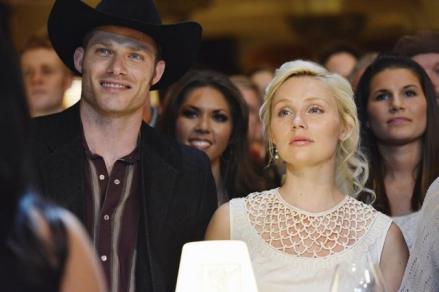So Nashville’s first season is over after one of the most overheated, soapy, damp finales imaginable. Pouring from the spigot we got—spoilers—a surprise pregnancy, a federal investigation, a violent alcoholic relapse, the fallout from an exposed family secret, the CMA results, a marriage proposal, and a fatal car crash. Also some very purty songs. The whole thing was pleasurable and engrossing: Nashville seemed newly committed to its soap opera id, rather than its prestige-drama superego. But having turned off the metaphorical bathroom lights, towel-dried my sadly non-Connie Britton-esque hair, and sat down at my computer, the name on my fingertips is…Will.
“Seriously?” you ask. “The show doesn’t return until the fall, it offers a totally jam-packed finale, and you want to spend your final TV Club on a minor character who has only been around for a handful of episodes?”
Yep. Will, played by The O.C.’s Chris Carmack, is an epiphany. He acts as broad and schmaltzy as the show would sometimes like to be, but his unique problem—how to reconcile his homosexuality with dreams of country stardom—is what keeps Nashville tethered to a more serious aesthetic. Other characters’ conflicts seem hammy and contrived: mistaken paternity! Murder-suicide! Misplaced guilt over a felonious brother’s death! But Will’s dilemma gets at universal themes of identity. It points, obviously, toward a huge failing in cowboy culture, which is the way its embrace of macho can edge into homophobia. Beyond that, it taps into a fear haunting anyone who has ever aspired to anything: What if what you want most isn’t compatible with who you are?
Yes, we can all agree that being openly gay should not stop you from becoming a king of country music. But does it? Songwriter Shane McAnally, who composed Juliette’s hit “Boys and Buses,” is out and thriving. Four famous country singers signed a letter in support of same-sex marriage earlier this month. That said, the white, rural audience for country music remains one of the most resistant to progress in gay rights: Only 32 percent of Tennesseans support same-sex marriage, compared to a 58 percent national average.
In an ideal world, Will would become a pioneer, doing for country music what Frank Ocean did for hip hop. Still, it’s not hard to imagine his career taking a hit if he opens up about his sexuality in Season 2—which would, of course, make for sterling drama, and give Nashville an opportunity to critique the real status quo. I do hope that critique happens somehow. For now, though, I admire the way the show refuses to judge Will for staying in the closet. It means that Nashville, for all its palpable love of country music, won’t sugarcoat the realities of prejudice. And it suggests to me that the showrunners see Will as more than the Archetypal Gay Character—that they recognize how coming out and jeopardizing his career would be as much a self-betrayal as concealing his sexuality surely is.
